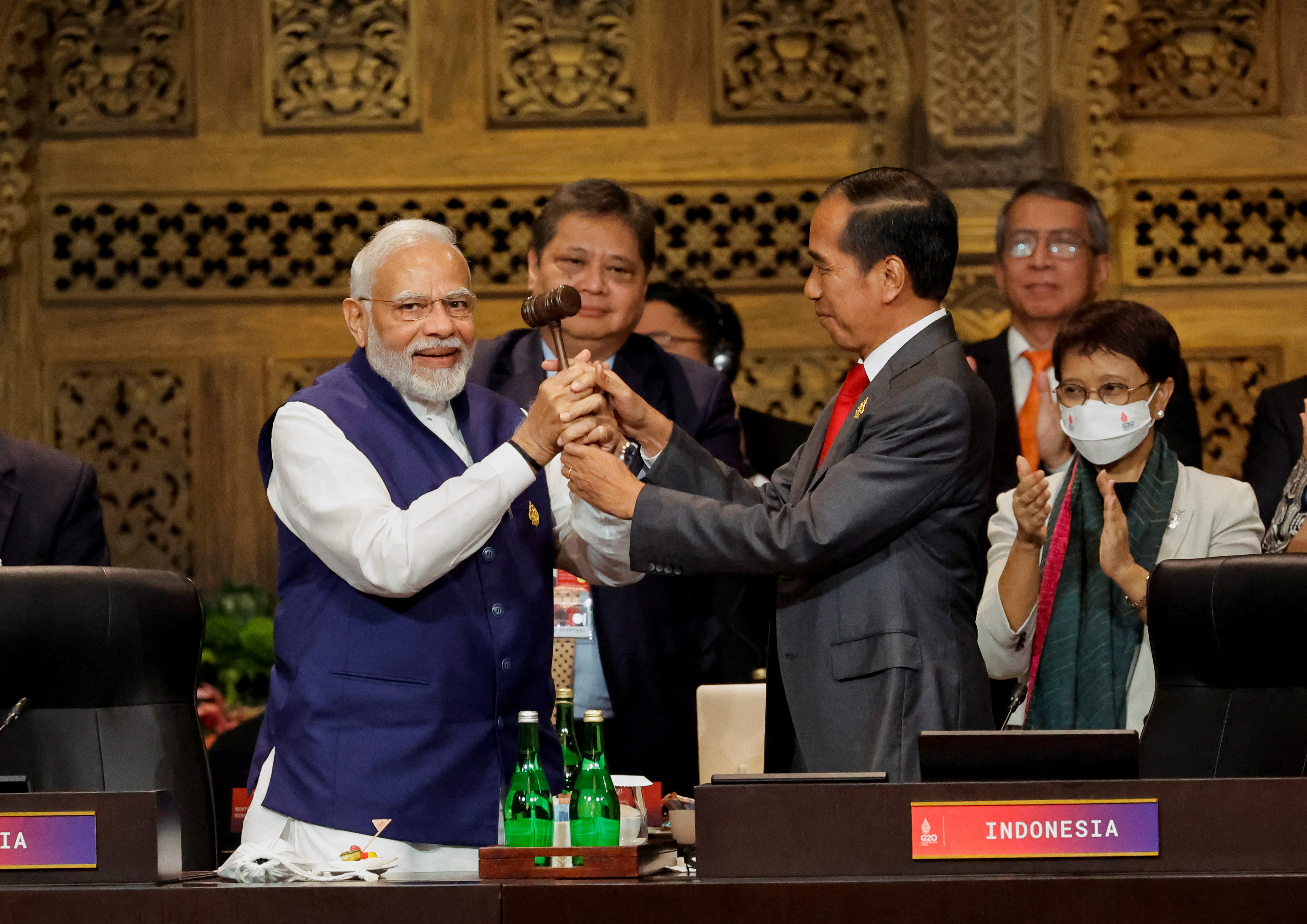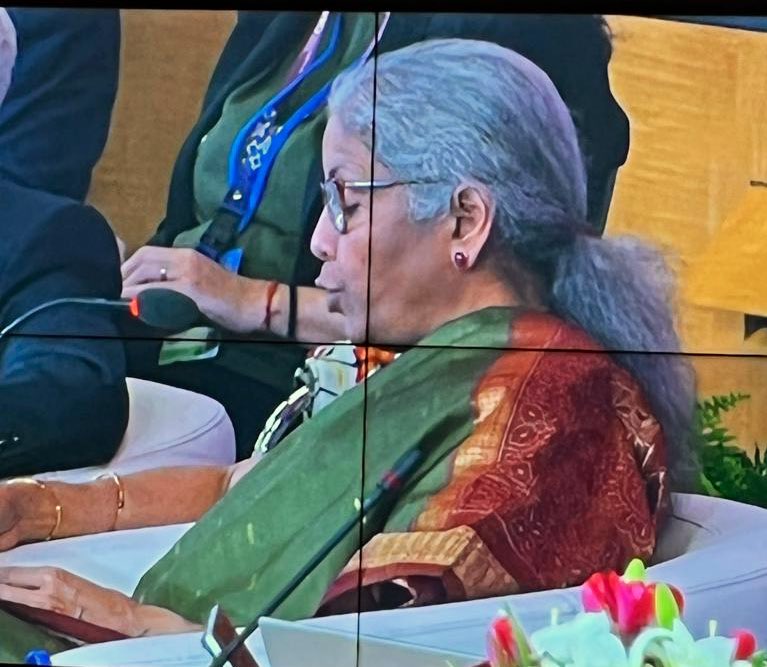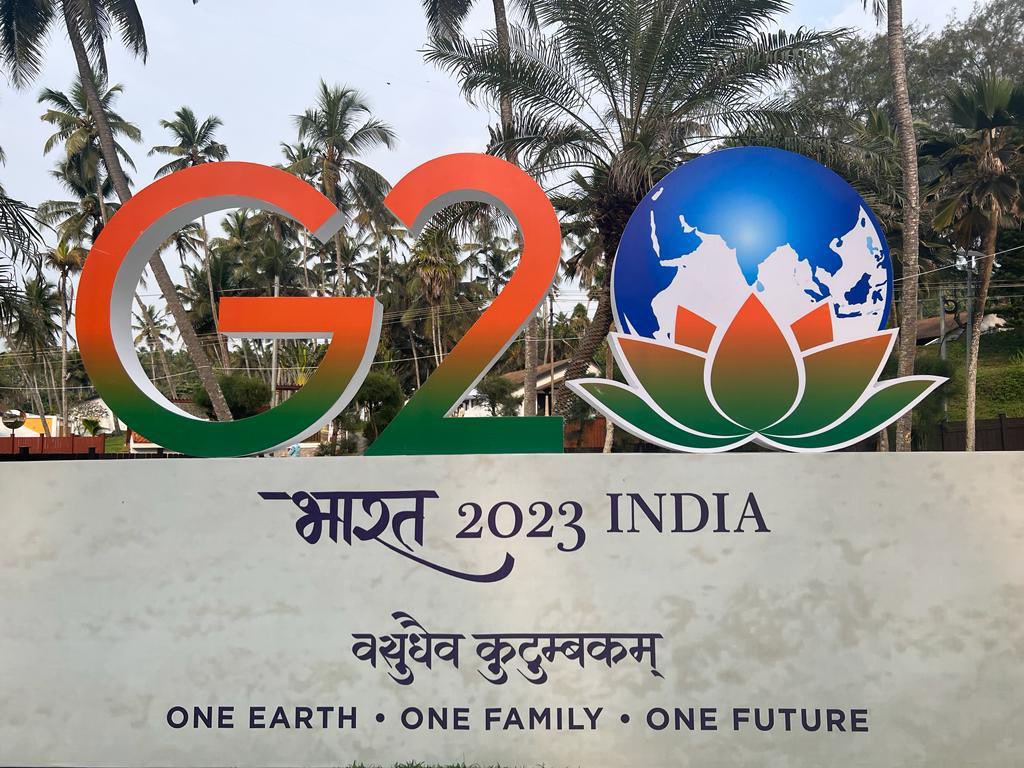On 1 December 2022, India assumed the Presidency of the Group of 20 (G-20). The G-20 represents 19 major economies and the European Union, comprising 85% of global GDP, over 75% of global trade, and about two-thirds of the global population. The theme of India’s G-20 Presidency is “One Earth, One Family, One Future”, also encapsulated in Sanskrit by the phrase Vasudhaiva Kutumbakam. India’s holistic interdependent approach to global issues emphasizes effective and equitable global cooperation. By the time the G-20 Summit is held in India on 9-10 September 2023, about 200 meetings of the G-20 would have been hosted in over 50 cities in India to carry forward the G-20 work plan across 32 different work streams. This provides a large canvas for global cooperation. India’s six declared priorities as the G-20 President are: climate change including climate action; inclusive and resilient growth; acceleration of progress on Sustainable Development Goals (SDGs); technological transformation and digital public infrastructure; women-led development; and reformed multilateralism. India’s endeavor is to make G-20 activities “human-centric”, with G-20 meetings held in India so far emphasizing the participation of all relevant stakeholders, including large numbers of youth. The G-20 Bali Summit held in November 2022 reiterated that the G-20 remains “the premier forum for global economic cooperation”. India’s Presidency of the G-20 has consciously focused on greater global cooperation within this economic framework. The main challenges for global cooperation today come from the impact of armed conflicts and unprecedented disruptions like the Covid-19 pandemic on socio-economic development. Agenda 2030 on Sustainable Development with its 17 Sustainable Development Goals (SDGs) represents the only universal framework for global socio-economic development. Two statistics illustrate the current grave human-centric dimension FILE PHOTO: India’s Prime Minister Narendra Modi and Indonesia’s President Joko Widodo take part in the handover ceremony at the G20 Leaders’ Summit, in Nusa Dua, Bali, Indonesia, November 16, 2022. REUTERS/Willy Kurniawan/Pool
FILE PHOTO: India’s Prime Minister Narendra Modi and Indonesia’s President Joko Widodo take part in the handover ceremony at the G20 Leaders’ Summit, in Nusa Dua, Bali, Indonesia, November 16, 2022. REUTERS/Willy Kurniawan/Pool
 FILE PHOTO: India’s Prime Minister Narendra Modi and Indonesia’s President Joko Widodo take part in the handover ceremony at the G20 Leaders’ Summit, in Nusa Dua, Bali, Indonesia, November 16, 2022. REUTERS/Willy Kurniawan/Pool
FILE PHOTO: India’s Prime Minister Narendra Modi and Indonesia’s President Joko Widodo take part in the handover ceremony at the G20 Leaders’ Summit, in Nusa Dua, Bali, Indonesia, November 16, 2022. REUTERS/Willy Kurniawan/Poolof the challenges facing Agenda 2030. According to the UN, about 60 million people world-wide were victims of armed conflicts when Agenda 2030 was adopted unanimously in September 2015. By 2022, that figure has risen sharply to 324 million people. In 2015, according to the World Bank, about 700 million people, mainly in sub-Saharan Africa and South Asia, were living below the poverty line. By 2022, about 685 people across the world were below the poverty line, with as many as 150 million, mainly in developing countries, pulled below the poverty line by the Covid-19 pandemic. The report underlined that global inequality had risen for the first time in decades, with income losses of the world’s poorest people being twice as high as income losses of the world’s richest people. In response, the priority for India’s G-20 Presidency has been to revive the momentum of global cooperation needed to achieve Agenda 2030 by its deadline of 31 December 2030. The identified SDGs subsume the six priorities identified by India during its Presidency. In the six areas that India has identified as its priorities, national initiatives taken by India have been shared with other G-20 countries, especially developing countries. India’s credentials for pushing greater global cooperation within the G-20 has strong foundations. Climate Change: The Climate Change pillar has been influenced significantly by India’s initiative to champion Climate Action. Two landmark proposals are adapting global Lifestyles for Environment (LiFE), and using renewable solar energy for development. The joint India-France proposal on harnessing solar energy, made during the 2015 Paris Conference of Parties of the UN Framework Convention on Climate Change has resulted in the creation of a new multilateral intergovernmental organization based in India, the International Solar Alliance (ISA). Today, about 120 countries are members of the ISA, which aims to mobilize US$ 1,000 billion in investments in solar energy solutions by 2030, delivering energy access to 1,000 million people using clean energy solutions and resulting in the installation of 1,000 GW of solar energy capacity. During its G-20 Presidency, India has focused on the need for G-20 developed country members to contribute both financially and through non-restrictive transfers of environmentally friendly technologies to enhance the national capacities of developing countries to meet global environmental targets. Inclusive Growth: India’s flagship initiative for a global Coalition for Disaster Resilient Infrastructure (CDRI) made at the 2019 UN Climate Action Summit anchors the growing emphasis within the G-20 on the need to sustain economic growth and build resilient supply chains, particularly after the Covid-19 pandemic and a series of natural disasters attributed to climate change. By developing standards and regulations to make infrastructure resilient in confronting disaster and climate risks, the CDRI seeks to expand a multiple stakeholder approach to sustain growth through a two-way knowledge transfer between developed and developing countries. India, which hosts the CDRI Secretariat, is currently the single largest financial contributor to this initiative. Sustainable Development: To assist developing countries to meet their national targets to implement Agenda 2030 and its SDGs, India and the UN created the India-UN Development Partnership Fund in 2017. With committed financial support of $150 million from India, the Fund has prioritized development projects in least-developed countries, landlocked-developing countries, and small island developing states. So far, 36 projects in 37 partner countries have been processed by the Fund. Technological Transformation: India’s successful experience in using digital technologies for governance and empowerment to accelerate development through a “whole of society” approach has made it a credible thought-leader in this area during its G-20 Presidency. In partnership with the UNDP, India has hosted a series of G-20 discussions to position India as a global hub for using open and interoperable standards to create a human-centric digital public infrastructure with lower implementation costs, especially for developing countries. Women’s Empowerment: India has prioritized women’s digital and financial inclusion through the use of digital technology. The current focus of G-20 meetings being held in India in this sphere includes effective outreach on education for women, greater participation by women in the workforce, larger representation of women in leadership positions, and the continued narrowing of the Nirmala Sitharaman, India’s Finance Minister, speaking at G20 FM meetings in Washington, D.C. April 20, 2022. Photo: Twitter @FinMinIndia
Nirmala Sitharaman, India’s Finance Minister, speaking at G20 FM meetings in Washington, D.C. April 20, 2022. Photo: Twitter @FinMinIndia
 Nirmala Sitharaman, India’s Finance Minister, speaking at G20 FM meetings in Washington, D.C. April 20, 2022. Photo: Twitter @FinMinIndia
Nirmala Sitharaman, India’s Finance Minister, speaking at G20 FM meetings in Washington, D.C. April 20, 2022. Photo: Twitter @FinMinIndiaidentified gaps on gender equality. Reformed Multilateralism: The Preamble of Agenda 2030 underscored that “there can be no sustainable development without peace and no peace without sustainable development”. India has taken the lead to implement this by pointing out that “this is not an era of war”. However, the ineffectiveness of existing multilateral institutions to ensure peace, security and development has highlighted calls for “reformed multilateralism”. The G-20 will need to give a major push to reform multilateral institutions like the UN and its Security Council, responsible under the UN Charter for maintaining international peace and security (where reforms mandated unanimously by world leaders in 2005 continue to be blocked by the five permanent members of the Security Council); the International Monetary Fund/World Bank, mandated by their Articles of Agreement to ensure global financial coordination for international reconstruction and development (where IMF quota and governance reforms agreed to in 2010 remain unimplemented till now due to delaying tactics by developed countries); and the World Trade Organization, created to ensure the primacy of multilaterally agreed trade rules based on non-discrimination (where reforms to enhance the organization’s integrity and effectiveness are being exploited since 2016 by the growing recourse of developed countries to unilateralism and protectionism). When India assumed the Presidency of the G-20 at the November 2022 Bali Summit, Prime Minister Narendra Modi declared that India’s “G-20 priorities will be shaped in consultation with not just our G-20 partners, but also our fellow-travellers in the Global South, whose voice often goes unheard.” On 12-13 January 2023, India hosted a virtual “Voice of the Global South for Human-centric Development” Summit. A measure of the importance of India’s initiative can be gauged from the fact that 125 countries responded to this initiative, including 47 from Africa, 31 from Asia, 29 from Latin America and the Caribbean, 11 from Oceania, and 7 from Europe. On 27March 2023, developing countries in the UN voted overwhelmingly to adopt are solution opposing unilateral sanctions due to their “extra-territorial” nature and adverse impact on the “right to development”. The deliberations of the G-20 under India’s Presidency will be carried forward through two processes. Within the G-20, three major developing countries (India, Brazil, and South Africa) will lead the G-20 during 2023-2025 creating a three-year window for implementing the priorities of the Global South. Outside the G-20, ongoing processes for enhancing international cooperation will come to a head with the UN’s SDG Summit in September 2023, followed by the UN’s Summit of the Future in 2024. These Summits are expected to result in the call for a General Conference to review the UN Charter, as recommended in April 2023 by the UN Secretary-General’s High-Level Advisory Board on Effective Multilateralism, to coincide with the UN’s 80th anniversary Summit in 2025. This represents a golden opportunity for India’s G-20 Presidency in consolidating a “human-centric” sustainable development paradigm, which will restore popular support for the principle of international cooperation upholding the functioning of the “world as one family”.[Ambassador (Retd.) Asoke Mukerji is Distinguished Fellow, Vivekananda International Foundation, New Delhi.] Source: https://www.newsindiatimes.com/
2023-08-14T11:58:00+05:30

